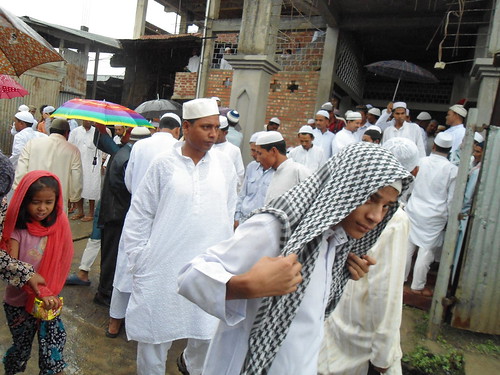The madrassas of Bukhara and Samarkand produced scientists, mathematicians, astronomers, philosophers, scholars, jurists, academicians, entrepreneurs etc but today madrassas produce such Muallim, Muezzin and Pesh Imam who join some madrassa, open one new madrassa or get attached to some Masjid.
By Sheikh Khurshid Alam,
There is something which has been troubling me a lot for quite many years. At one point of time, I stopped pondering over the issue, out of the fear of losing my Imaan but the incident of Prophet Ibrahim (pbuh) – where his curious mind asks Allah Almighty that how can a dead, whose flesh and blood dissipates in the earth, be brought back to life on the Day of Judgment – vanished my fears. Allah does not get angry with Khalilullah for raising question of such a nature, rather, He answers him with a beautiful practical demonstration.
The cause of my trouble is the myriad differences among the Ummah. Each group leaves no stone unturned to malign the other. ‘Jewish Agent’ is the favourite slang used as a reference for the other. The Barelvis term the Deobandis as ‘Jewish Agent’, the Deobandis call the Jama’at e Islami people as ‘Jewish Agent’, for the Tableeghi Jamaat people, the Wahabbis are ‘Jewish Agent’, the Jamiat Ahl e Hadith calls the Barelvis as ‘Jewish Agent’ and this interesting name-calling continues in all the forms of cycles.

File Photo used for illustration purpose only
The people to have the last laugh are the real “Jewish Agent”, who do not have to spend a single penny for promotion or hire any personnel to do their job; as everything is meticulously done by so many groups of Muslims. There is a great saying in Bhojpuri – ‘Hing lage na Fitkari, rang bhi aae chowka’.
Even if we put aside this groupism, we cannot escape the fight between the people of different ‘school of thought’. In the Indian sub-continent, the Hanafis boast the majority in terms of following. The Hanafi scholars are always found saying that all the four Madhabs are true and the Muslims are free to choose from any of these but the truth is that these very scholars and their followers show the worst form of intolerance towards anybody outside the fold of Hanafi school of thought. The Hanbalis, Shafaeis and Malikis are looked upon as outcast in most of the Hanafi Masjids and such gatherings. Since the Jamiat ahle hadith are not from any of the four schools of thought, they are considered as a different species and the special “Jewish Agent”. There is no point in talking about the Shia Muslims here, who are not even ‘Muslims’ for many Sunni Muslims.
The Ahl e Hadiths are very articulate in terming anybody and everybody as Kafirs, all those who are not from Jamiat Ahl e Hadith. According to them, no school of thought is proper and hence there should be no adherence to any. The common claim against the Ahl e Hadiths is that they receive huge amount of petro-dollars to create rift between all the groups of Muslims.
One of my friends, who is now at University of Westminster, London considered the Darul uloom Deoband as the ‘Madrassas’ Factory’ of Asia and strongly objected to the mushrooming of madrassas everywhere in the country. I was very annoyed at his observation but after his explanation, I was forced to rethink. He said that the so-called madrassas have strangulated the spirit of education. The madrassas have only helped in preventing the children from turning into Kafirs and that’s it.
The madrassas of Bukhara and Samarkand produced scientists, mathematicians, astronomers, philosophers, scholars, jurists, academicians, entrepreneurs etc but these madrassas produce such Muallim, Muezzin and Pesh Imam who join some madrassa, open one new madrassa or get attached to some Masjid. This process of Madrasa-students-madrasa goes on and on. There can be scarcity of schools, colleges and universities but there can be no scarcity of Masajid and madrassas in India.
We often relate to market places, media houses and political outfits to controversies but the places of worship such as Masjid, Mandir, Church and Gurdwara are no less controversial. Incidents such as quarrel between different committees of a single Masjid, controversial Jummah speeches, high handedness of Masjid Committee over Imam and Muezzin etc have become very common now-a-days. I have been so disheartened by some of the Jummah speeches that there is no enthusiasm left to attend any, but I do, with a hope that some good sense will prevail, someday.
Something exciting happened last Friday during the Jummah speech, which motivated me to write this piece. The learned scholar at the Masjid started his speech on the topic of Ramdan and its importance. It is pertinent to mention here that the said Masjid has one of the largest congregations in Jummah. All was going well until the learned scholar stuck to the topic of 20 rakah Tarawee prayers. Half of his speech revolved around his claim that there is only 20 rakah Tarawee prayers and 08 rakahs has no legitimacy and those who pray 08 rakahs are Gumraah. There were murmurs in the congregation. After the Jummah, small groups of people had already started a debate over the number of rakahs and heated arguments marked the day.
I came to know from my friends, who had offered Jummah at different Masajid of different school of thought that almost all the learned scholars had raised one or more controversies in their speeches and left the people confused and angry. With thousand questions in my mind, I felt helpless and dejected with the state of affairs of the Ummah.
Is this the same Ummah whom Allah has called the ‘Best of Mankind’? The Ummah which is not tolerant towards its own people can be least expected to be tolerant towards other faiths.
…….
(Sheikh Khurshid Alam is pursuing LL.M second year from the Department of Law, City Campus, Aliah University, Kolkata).

